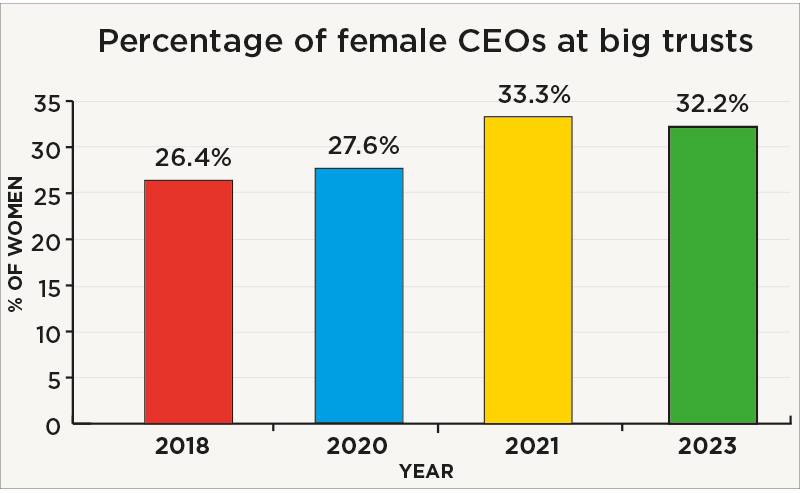Progress in bridging the gender gap at the top of England’s biggest academy trusts has stalled.
The latest Schools Week diversity audit of the trusts with 15 or more schools has revealed women occupy just under 32 per cent of the top jobs.
This halts the progress made in previous years in boosting the number of female leaders, up from 26 per cent in 2018.
The number of black, Asian and minority ethnic (BAME) leaders across the trusts has risen from two (1.7 per cent) in 2021 to four (2.8 per cent).

Ann Palmer, the chief executive of the leadership support organisation Fig Tree International, said system-wide change was needed to ensure senior and executive leadership reflected the diversity of the student body.
Our audit found 45 of the 143 chief executives leading the country’s biggest trusts were women (31.7 per cent). This is down from 33 per cent in the last audit two years ago.
Of the four BAME chief executives, just one is a woman, Jennese Alozie of the University of Chichester Academy Trust.
Latest workforce data shows almost 75 per cent of teachers and more than 66 per cents of heads are female.
Mohsen Ojja, the chief executive of the 16-academy Anthem Schools Trust, said he was “genuinely surprised” by the findings.
He believes leadership “practices and procedures should be geared towards capitalising on the skills of all groups, including those that are under-represented”.
DfE CEO scheme to ‘pay attention to diversity’
The government last week awarded a contract to develop “the next generation” of trust chief executives to the National Institute of Teaching (NIoT). The first 25 participants will start in February, with another 50 later.
A spokesperson for NIoT said it will “pay attention to diversity in our communications, recruitment and programme design” and expose those taking part in its programme “to highly skilled leaders from a range of backgrounds”.
Sir Hamid Patel, the chief executive of Star Academies and one of the four BAME leaders in our analysis, added: “We need to embed meritocratic principles at every level so that barriers to individuals’ progress are removed, irrespective of their gender or ethnicity.”
He said policies must be developed that “shatter glass ceilings that still depress progression, not only for women and the BAME community but also for people with white working-class backgrounds”.
Academy trust quality descriptors published two months ago by the government noted that trusts will be expected to “take action to promote equality and diversity” in their workforces.
In September, 15 key sector bodies – including the Confederation of School Trusts and school leaders’ union ASCL – made commitments to help improve the level of diversity in the profession.
Oasis Community Learning was the only academy trust to sign up to the commitment. Paul Tarry, its director of people, said staff networks were helping to devise action plans for the rest of the trust.
He added that the results of new equality, diversity and inclusion surveys were also informing decisions. The proportion of black and Asian staff has risen across its 4,500-strong workforce in the last 12 months from 12.4 per cent to 12.9 per cent.
A report published two years ago by the Forum Strategy – a MAT chief executive network organisation – called on the government to commit to addressing the diversity of boards that appoint and promote senior leaders.
It also recommended that CEO diversity should be tracked.
A National Governance Association study in September found just 6 per cent of school governors and trustees responding to its annual survey were BAME.
Earlier this year the DfE told governing boards to collate and publish their own diversity data, saying “we want governing boards to be increasingly reflective of the communities they serve”.
The issue of representation is not only prevalent in education. About 24 per cent of the NHS workforce is made up of black and minority ethnic staff – but they account for just one in 10 “very senior managers”.
In the police, just 5.5 per cent of senior roles are held by BAME officers.
How diverse are government departments?
And across the Department for Education, Ofsted and Ofqual, fewer than 39 per cent of those listed as ministers or in the “our management” sections of their websites are female, a 4 per cent fall since 2021.
Just one person – children’s minister Clare Coutinho – is BAME.
Ofsted insisted the data was “not representative of our entire senior civil service workforce” and it was “taking action to address this through our attraction strategy and development programmes”.
An Ofqual spokesperson stressed nearly 66 per cent of the watchdog’s workforce and 55 per cent of its “most senior managers” were women.
DfE said it “knows there is more to do” on leadership diversity. Its MAT CEO programme will “increase the quality and diversity of leaders in the system.
Correction: This piece was amended to state 45, rather than 46, chief executives were female after a trust clarified it did not have joint CEOs.
















Your thoughts